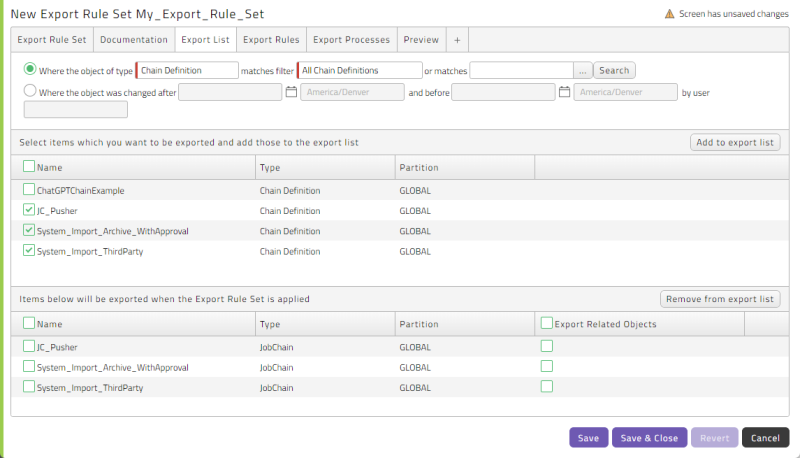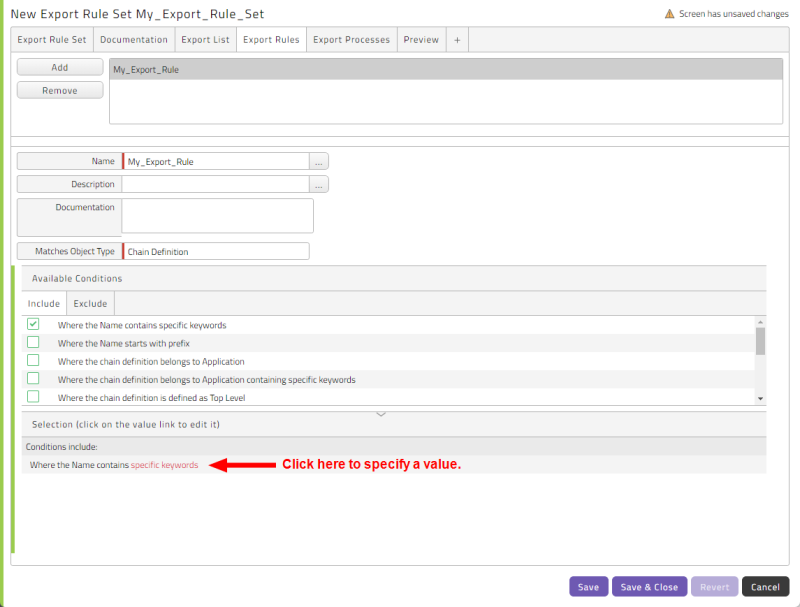Working with Export Rule Sets
Export Rule Sets determine which objects are exported into CAR archives.
Creating an Export Rule Set
To create an Export Rule Set:
-
Navigate to Promotion > Export Rule Sets.
-
Click
 .
. -
Choose a Partition and enter a Name.
-
If you want the Rule Set to contain an export list, click the Export List tab. Use the search interface at the top to locate objects you might want to add to the export list. Then check the names of the objects you want to export and click Add to export list. Once you have added an object to the list, you can check Export Related Objects to include any dependencies for that object.

-
If you want the Rule Set to contain one or more export rules, click the Export Rules tab. Click Add to add an export rule, then choose an option from the Matches Object Type dropdown list. In the Available Conditions area below this field, use the Include and Exclude tabs to add conditions to the export rule.
The included conditions are listed in the Selection area. If one of the conditions has a red parameter, click it to specify a value.

Note: If you select Extend filter with user-defined SQL, you can further limit the scope of the Export Rule Set by specifying the contents of a
WHEREclause. You do not have to enter theSELECTportion of the SQL. -
To preview the list of objects to be exported by the Export Rule Set, click the Preview tab.

-
When the list of objects in the Preview tab is correct, click Save & Close.
Tabs and Fields
The following sections cover the tabs and fields in the Export Rule Set editor screen.
Export Rule Set Tab
| Field | Description |
|---|---|
| Partition | The partition of the Export Rule Set. |
| Name | The name of the Export Rule Set. Must start with a letter. Can only contain US ASCII letters, numbers, and underscores (_). Limited to 80 characters. |
| Application | The application assigned to the Export Rule Set. |
| Description | The description of the Export Rule Set. Free-form text. Any printable UTF-8 character combination is allowed. Note that depending on the platform/browser, some characters of the symbol and other Unicode tables will not be displayable. Limited to 255 characters. |
Export List Tab
The Export List tab lets you create a static set of objects to export. You can search for the objects you want to export and add them to the list of objects to be exported.
| Field | Description |
|---|---|
| Where the object of type | The type of object you wish to export |
| Where the object was changed after [...] and before [...] by user ...[] | Instead of specifying an object type, you may specify modification dates and the user who modified the objects for displaying a list to choose from. |
| List of found objects | This middle list contains a list of all objects that match the search criteria. Select the objects you want to include and then click Add to export list. |
| List of objects to be exported | This bottom list contains all objects that you have added to the export list. You can remove objects from this list by selecting them and clicking Remove from export list. |
Export Rules Tab
| Field | Description |
|---|---|
| Name | The name of the Export Rule Set. Must start with a letter. Can only contain US ASCII letters, numbers, and underscores (_). Limited to 80 characters. |
| Description | The description of the rule. This value will be used as the name of the rule if it is set. Free-form text. Any printable UTF-8 character combination is allowed. Note that depending on the platform/browser, some characters of the symbol and other Unicode tables will not be displayable. Limited to 255 characters. |
| Documentation | A comment about the rule. Free-form text. Any printable UTF-8 character combination is allowed. Note that depending on the platform/browser, some characters of the symbol and other Unicode tables will not be displayable. Limited to 1000 characters. |
| Object Type | You can create rules that match a variety of object types. For each rule, an object-specific filter is displayed. |
Context Menu
Export Rule Sets support the following context menu options.
Note: For generally applicable object context menu options, see Object Context Menu.
| Action | Description |
|---|---|
| Submit Export Job | Submits an export process with the current Export Rule Set |
| Edit Security | Edit the security of the Export Rule Set |
| Duplicate | Make a copy of the Export Rule Set to create a similar one |
| Delete | Delete the Export Rule Set |
| Edit | Edit the Export Rule Set |
| New | Create a new Export Rule Set |
Security
The Security tab allows you to specify which users can access, edit, and delete the object.
| Privilege | Description |
|---|---|
| ExportRuleSet.Create | Create Export Rule Sets |
| ExportRuleSet.Delete | Delete Export Rule Sets |
| ExportRuleSet.Edit | Edit Export Rule Sets |
| ExportRuleSet.View | Access Export Rule Sets |
You can grant privileges on two levels, Access and Admin. A privilege granted at the Admin level allows the grantee to grant the privilege to other users. These privileges can be granted per partition or system-wide.